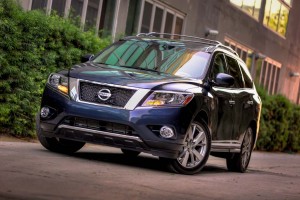Nissan plans to recall more than 188,000 of its sport-utility vehicles worldwide due to the increased risk of a crash posed by potentially faulty brake software, the maker has announced.
The move comes less than a month after the maker recalled more than 900,000 vehicles due to a flaw with accelerator sensors that could cause them to run slowly or even stall out.
The latest safety service action was triggered by reports that, on rough or uneven roads the software used to control the vehicles’ antilock braking could malfunction and result in longer stopping distances than drivers might expect. As a result, a motorist might rear end another vehicle, for example, or fail to stop in time at an intersection.
The maker says there have so far been no reports of accidents or injuries related to the problem.
Of the 188,302 Nissan SUVs affected worldwide, 151,695 of them were sold in the United States during the 2013 and 2014 model-years. That includes Nissan Pathfinders from the 2013 and 2014 model-years, as well as Infiniti’s three-row crossover the 2013 JX35 – which was renamed the QX60 in 2014.
The remaining vehicles were sold in Canada, China, Russia, Mexico, India and other parts of the world.
As is typical with safety recalls, the second-largest of the Japanese makers plans to notify owners in the coming weeks and then make repairs at no charge to owners. The repair is expected to involve minimal down time as it will simply require the reprogramming of the affected vehicles’ current ABS controllers.
(Consumer Reports slams newest Infiniti, Lexus. For more, Click Here.)
It is unclear whether the Nissan recall was delayed as a result of the recent U.S. government shutdown. That political fracas shut down much of the National Highway Traffic Safety Administration, the agency responsible for investigating safety-related vehicle problems and, if necessary, ordering recalls.
(Click Here to read about Nissan’s recall of 900,000 vehicles.)
Automakers, in general, have been increasing the number of vehicles covered by recalls over the last several years, safety advocates contending the NHTSA has been responding to criticism that it had grown too cozy with automakers and may have let some potential problems slip by.
Nissan, in particular, has faced a number of safety-related service actions involving a wide range of products, from the little Juke crossover to the big Titan pickup. Problems have included faulty transmissions as well as brakes, airbags and even inaccurate labeling.

